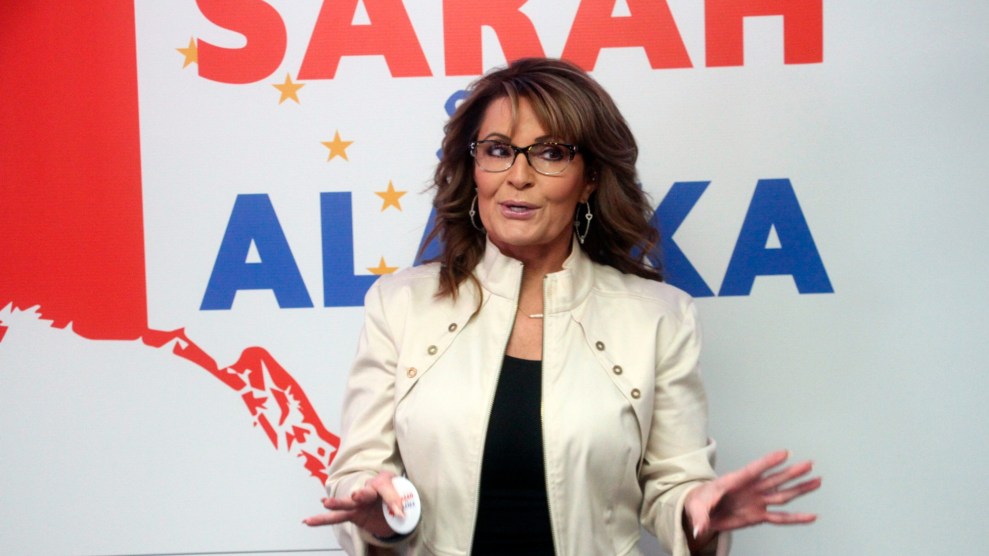
Palin at an Anchorage campaign event on April 20, 2022.Mark Thiessen/ AP
Alaska has just one seat in the House of Representatives, and Sarah Palin (she’s back, baby!) wants it. Earlier this spring, when the former governor announced her return to campaigning after 14 years, the move drew national attention to a seat that became vacant after the March death of Rep. Don Young, the longest-serving member of Congress in GOP history. But while Palin leads the field in national name recognition, she’s still facing an uphill battle: To win, she’ll have to defeat a record-breaking field of 47 other candidates.
That extensive field is due in part to the state’s new mail-in nonpartisan primary, which is open to all candidates, regardless of party affiliation. Voting in the special primary, which started on April 27, concludes on June 11. The four candidates with the most votes will advance to a ranked-choice special election in August—and in such a right-leaning state, it’s quite possible that there won’t be a single Democrat on that list of finalists. To make things more complicated, the special election is just to fill Young’s seat through the end of his term this year, which means the winner will have to run once again in November.
Even for those who aren’t closely following the intricacies of Alaska politics, there are plenty of reasons not to ignore this race. For one thing, although the state is small in population, its congressional delegation helps secure disproportionate amounts of funding (last year, Alaskans got about $24,000 per capita in federal funding, compared to less than $15,000 for other sparsely populated states like Wyoming and Vermont). And whoever wins could have the chance to shape national politics for decades. Young represented Alaska for 49 years, and his seat was pretty much glued to him—even putting a knife to GOP ex-Speaker John Boehner’s throat didn’t threaten his job security. Seniority is power in Congress: If your predecessor coasted to reelection for half a century, you could be looking at the literal gig of a lifetime. Visualize Sarah Palin in Washington well into her eighties. (At the same time, the new ranked-choice voting system may help reduce long stints of incumbency.)
Young at least crossed the aisle at times, most recently for Biden’s big infrastructure bill. Palin, a pro-Trump, anti-vax, rigged-election conspiracist, probably wouldn’t. But she hasn’t held office since quitting the governorship in 2009, so who knows? What she has done: served as a Fox News pundit, hosted the reality show Sarah Palin’s Alaska (IMDb rating: 2.6 out of 10), appeared on The Masked Singer, hosted yet another show about “America’s outdoor lifestyle”—in other words, she’s a celebrity. And it’s worked: Polling shows she’ll likely advance to the top four. Still, proponents of ranked-choice voting argue that the system is better at finding a consensus candidate—which could be bad news for a more politically extreme figure like Palin.
Palin’s competition includes six Democrats, 16 Republicans, 22 with no party affiliation, two Libertarians, one American Independent Party candidate, and one from the Alaskan Independence Party. Additionally, four Alaska Native candidates are running to be the first Native congressional representative from the state with America’s largest Native population share (about 19 percent).
Let’s meet some of those 48 candidates.
Nick Begich III: Begich comes from Alaska’s best known Democratic dynasty—his grandfather, Nick Begich Sr., held the state’s congressional seat before Young. But this Begich is a Republican, and he’s emerged as one of the frontrunners in the race. While Palin has the national endorsements from Trump and his circle, it’s Begich, the chair of a software company, who has the endorsements from state political leaders and leads the field in fundraising (though half of the money he’s raised is from his own pocket). Begich was one of the only candidates to enter the race while Young was still alive, running to the congressman’s right: He was vocally critical of Young’s spending and, reportedly, his enforcement of a vaccine mandate for congressional staff. Begich also recently finished up a fellowship with the conservative activist Club for Growth—according to the Guardian, one of the biggest backers of Republicans who voted to overturn the results of the 2020 presidential election.
Al Gross: In the spirit of the frontier, many Alaskans choose to buck conventional party lines and go solo. One of those candidates, orthopedic surgeon Al Gross, will at least be familiar to most voters. An independent, he ran an unsuccessful campaign to unseat Republican Sen. Dan Sullivan in 2020, ultimately losing by more than 10 points in the general election. This year, after Gross wouldn’t commit to caucusing with Democrats if elected, the state’s Democratic party disavowed him, saying he was “not a liberal” and “a proven loser.” Gross has campaigned on a platform to make healthcare more affordable, though he’s said he doesn’t necessarily support Medicare for All. And in true Alaskan form, he’s pro-oil—so don’t expect a Green New Deal from this one (although he is a strong supporter of renewables). Many voters remember him as the “Bear Doctor” after a quirky campaign video recounted the story of him shooting a bear in self-defense. Gross, along with Palin and Begich, is extremely likely to advance to the general election.
Mary Peltola: Peltola, a Yup’ik Alaska Native woman and former state legislator, is one Democrat who could possibly crack the top four—she’s won support from some prominent tribal leaders and former legislators. Peltola has touted food security, a growing concern for Alaskans in recent years, as one of her main issues. Her campaign strategy has involved emphasizing her credentials as a moderate Democrat and playing up her personal connection to the late Don Young—she’s talked about eating Thanksgiving dinner with him when she was just in high school. Peltola’s past may haunt her, though: In 2005 she was the tie-breaking vote in the decision to eliminate the state’s teacher retirement plan, a move she recently described as “the biggest regret of my legislative career.”
Josh Revak: An Iraq combat veteran and current representative in the state legislature, Revak has been endorsed by the late Don Young’s wife, Anne, who claims that he is the successor the congressman wanted. That’s not insignificant to the many Alaskans who want to see Young’s work continued, and Revak hasn’t shied away from touting that endorsement. Unlike Begich, who criticized Young’s spending in Washington, Revak told the Anchorage Daily News that he will continue Young’s “legacy by putting partisan politics aside.”
Tara Katuk Sweeney: GOP candidate Tara Sweeney is Inupiaq and hails from Utqiaġvik, the northernmost town in the US. She’s worked in state Republican politics since 2003, and Trump chose her to serve as assistant secretary for Indian Affairs from 2018 to 2021. After Begich and Palin, she is one of the more serious Republican contenders in the race: She’s one of the top fundraisers and has attracted support from many of the state’s Alaska Native corporations. Sweeney is also a vocal backer of the controversial drive to drill for oil in the Arctic National Wildlife Refuge.
Christopher Constant: A Democratic member of the Anchorage Assembly, Constant is also one of the candidates who announced he was running while Young was still alive. Despite living in a red state, he hasn’t shied away from running on a liberal platform and told the Anchorage Daily News that he strongly supports abortion rights and gun control measures. As a state legislator, he’s focused on issues of housing, behavioral health, raising wages, and worker safety. Constant is also the first openly LGBTQ person to run for the Alaska congressional delegation.
Santa Claus: No, but actually. Santa Claus is a member of the North Pole City Council (yes, that’s a real town) who legally changed his name back in 2003. Complete with the white hair and beard, his policies resemble a less merry but also white-haired man: Bernie Sanders. Although running as an independent, Claus is a self-described “progressive, Democratic socialist” who supports Medicaid expansion. In his pre-Santa days, he worked as the special assistant to New York City’s deputy police commissioner, and as such told the Anchorage Daily News that he doesn’t believe in “defunding the police,” despite his left-wing credentials. He’s only running to fill out the rest of Young’s open term and doesn’t plan to campaign to fill the seat in 2023. Want to donate to Santa Claus? Too bad—he isn’t taking your money. He’s running his campaign on 400 bucks of his own cash. No word yet on whether he’ll have lumps of coal for naughty members of Congress—although some extraction-hungry Republicans might like that.
Correction, June 8: An earlier version of this story mischaracterized Alaska’s new ranked-choice voting system. Only the general election uses ranked-choice voting. The story has also been updated to correct Christopher Constant’s job title.















